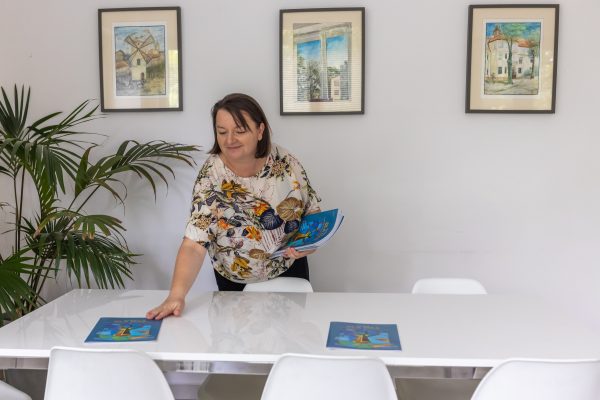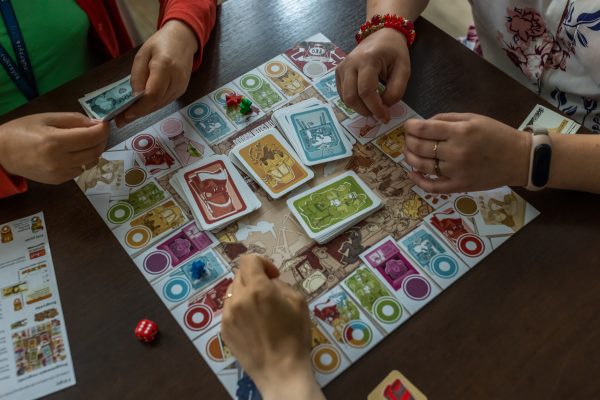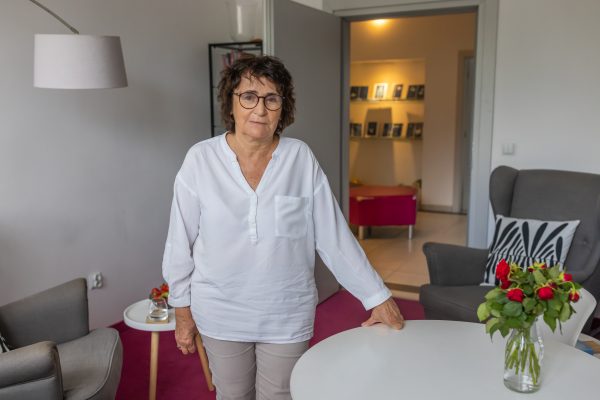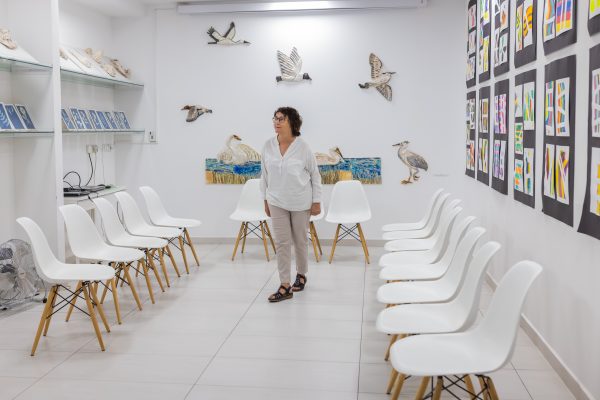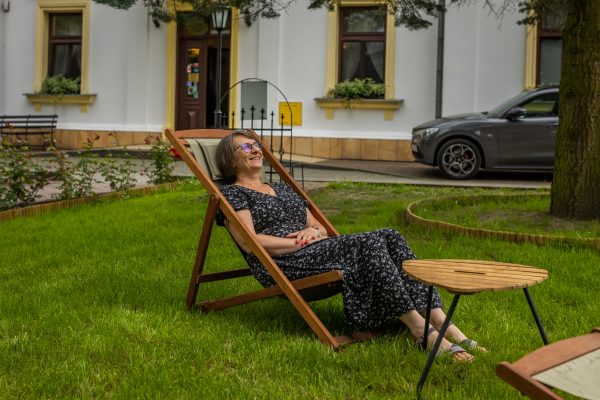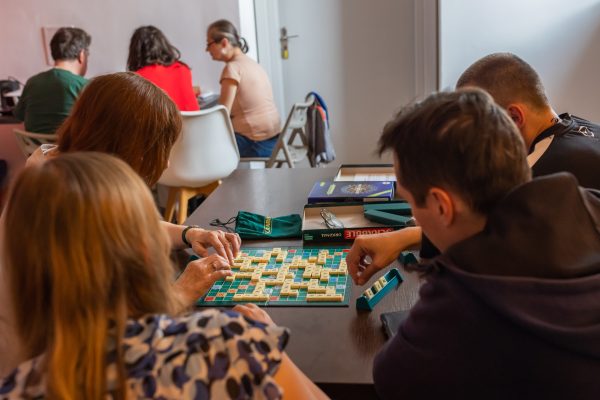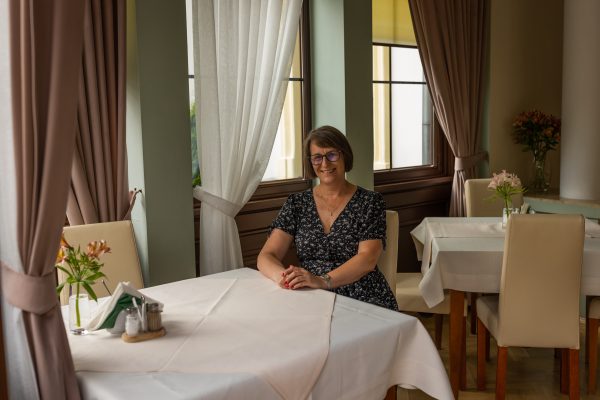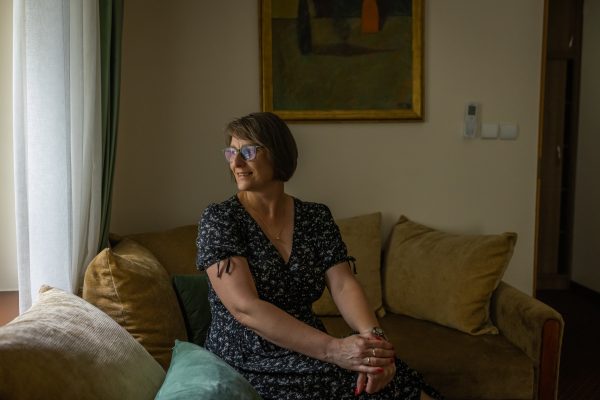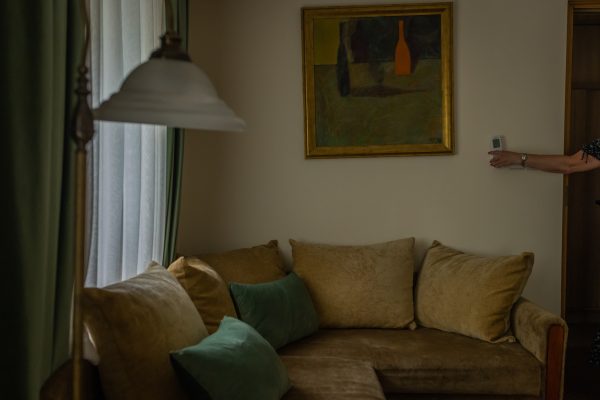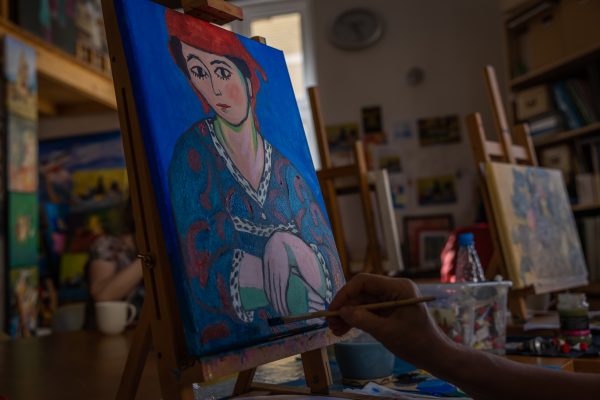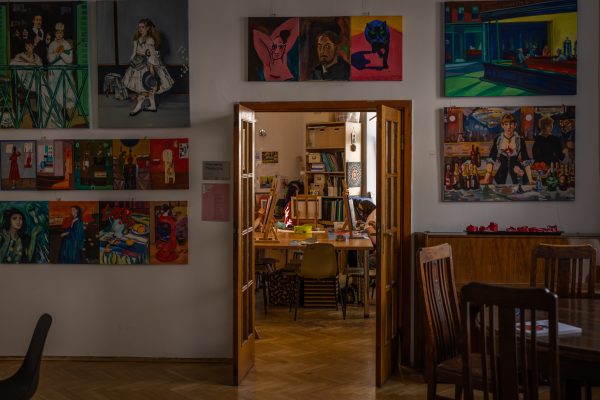
The most difficult thing is to stand up in front of a group of strangers, introduce yourself, and say: “I had a mental breakdown”. On the other hand, sometimes people are curious and pay attention, and other times there is shame and embarrassment. When that happens, it is best to focus on one person who looks interested, and tell your story to them.
Barbara has been talking about her illness and recovery for twenty years. About her life before she became ill: childhood in a little town outside Kraków, studying pedagogy, youth, and a carefree life. About the first breakdown: in the third year of her course, psychosis, hospitalisation. Forty years ago, it was different to today: patients were pacified with huge doses of drugs and strapped to the bed. She was hospitalised again on a number of occasions at various times in her life. At the end, she talks about recovery: that new generation drugs and psychotherapy help, but the patient also has to have the opportunity to return to society. That life itself: work, friendship, relationships with others are a cure. She herself is married with four children and three grandchildren. For twenty-five years, she was a primary school teacher, and for fifteen years she has been active in the Kraków Association “Otwórzcie Drzwi” (Open the Doors).
– I have trained doctors, employees of state authorities, employers, and clerics. Why clerics, you ask? Because when they have their first breakdown, many people go to a priest, and priests should be able to distinguish between spiritual uplifting and illness.
Recently, she held awareness-raising classes for medical students. – Everyone is very surprised at the end. They say that they definitely did not expect that a person with mental illness can be like that, i.e. communicative, making contact, and so articulate. Because what are the associations connected with mental illness? Something weird, unpredictable and even dangerous. This is the stigma that we are trying to counteract.
One out of one hundred
According to the World Health Organization, one in four people has had or will have a mental breakdown in their lifetime. One in one hundred people has Schizophrenia. Try to imagine that one percent: that means one student at a lecture in a university lecture theatre. One person in a small cinema or crowded bus. In the whole of Poland – almost 400 000 people struggling with illness, and discrimination and exclusion as well.
– I became ill at the end of my course. I stated openly in my application for a study break the reason why I needed to get treatment, and no one raised any objections. In between, my subject ceased being taught as a full-time course, but I was permitted to take the examinations on my own – Barbara says. – Not everyone was so lucky. A friend in a similar situation was told that she would not finish her course in any case. She was studying psychology at the Jagiellonian University.
When she finished her pedagogy degree, Barbara returned to her home town, situated between Kraków and Nowy Sącz. She found a job at the local primary school. – None of the teachers had ever looked at me suspiciously. If something was happening, I went on sick leave and then returned to work in the normal way, but I know that this approach is probably the exception. Young people who get jobs in corporate firms today are unwilling to tell anyone that they have had a breakdown of that kind. They formulate their CV to conceal a year or two spent getting treatment and then make sure that it does not get out at work. They worry that from the start they will be rejected as worse employees.
The schizophrenia gene and other myths
ARC Rynek i Opinia conducted a survey in 2019 on Poles’ attitudes towards people with schizophrenia, and it revealed that 59 percent are aware that with the correct treatment, people can lead an active social and professional life. Despite this, only 26 percent would approve of a neighbour of that kind, 30 percent – a friend, and 17 percent would decide to work with a person who had schizophrenia.
24 percent are scared of a person who has been diagnosed with schizophrenia, 22 percent think that they may be a danger to those around them, and 9 percent think they should be excluded from “normal life”.
What is the reason for such prejudice? – due to ignorance – Katarzyna Ostalecka of the Association for the Development of Community Psychiatry and Care says. – I don’t think there is any other illness about which such harmful myths have evolved.
The main myth, which is the most harmful, is that people with schizophrenia are aggressive. Meanwhile, the statistics show that a patient is more likely to experience aggression than be the perpetrator.
Another myth is that schizophrenia is hereditary. – We hear people say that people with schizophrenia should not become mothers and start a family – Barbara says. – There have been cases of a pregnant woman going to a gynaecologist, when the first thing she was asked was “shall we do an abortion?”
The mythical gene that causes schizophrenia has been sought for many years – to no avail. Today it is thought that it is not the illness itself, but susceptibility to the illness, that is hereditary. What is the difference? In the case of a person who is susceptible, the illness could develop in certain circumstances – such as trauma, family issues, or a dysfunctional environment, but this will not necessarily happen.
The third myth is that schizophrenia is something to which you are condemned and there is no cure. Studies and the opinions of experts disprove this. Professor Andrzej Cechnicki, head of the Community Psychiatry and Psychosis Research Center, Chair of Psychiatry, Jagiellonian University Medical College, who has been researching and treating schizophrenia for nearly fifty years, says that on average one in three patients recovers, and half recover sufficiently to lead an active and fully independent life. This is largely due to new generation drugs that do not have as many side effects and can be given in the form of an injection every three months.
– The bad reputation is exacerbated by the media – Barbara says. – When there is a murder somewhere, it is common to read that the perpetrator was probably being treated for mental illness. People of this type are often portrayed in extreme situations and in a sensational manner in movies. You will not see someone who has made a full recovery in a movie of that kind.
Imbalance
So what are the facts? Schizophrenia is considered an illness that is multifaceted with causes hard to identify, and which proceeds in many diverse ways. The symptoms are so diverse that experts describe it in terms of a group of disorders. Some avoid using the word schizophrenia due to it being too stigmatised, and prefer the term psychosis, psychotic episode, or F.20, the international code used for the disorder.
– There is no single cause of schizophrenia – Professor Cechnicki says. – the range of causes can vary from person to person. Nowadays, diagnosis is constantly improving.
It usually affects young people below the age of 30. It can start slowly, when a person gradually retreats from life and becomes engrossed in their own life, or suddenly and unexpectedly. “For years, I had increasing anxiety towards the world and people, but not focused on a specific object. I did not ask anyone for help, and I did not know that I needed help, and indeed no one knew. I was simply a withdrawn girl from the country, a local freak and object of ridicule. This is how it happens. Until eventually that anxiety exploded”i – Luiza Kula writes in the book “Umacnianie i zdrowienie. Contra spem spero” (Empowerment and recovery. Hope against all odds).
The most typical symptoms of schizophrenia include hallucinations, delusions, and disorganised thinking. In the movie “a Beautiful Mind”, about the life of a mathematician and subsequent Nobel Prize winner John Nash, the main character is convinced that he is working with the US intelligence service, and Soviet agents are plotting to take his life. In the book “Obłęd” (Insanity), which is partially autobiographical, the Polish writer Jerzy Krzysztoń describes seeing random people he meets as people persecuting him or as allies. “At one point I forgot who I was and what my name was. In my head I heard mixed voices shouting. I went into town and lost my bearings, and did not recognise any places, street names, or churches I would go to” – says Luiza Kula, talking about her psychosis.
At a biochemical level, psychosis is caused by an imbalance in the brain neurotransmitter system, and more precisely – excess dopamine in the limbic system, which is responsible for emotions. A dopamine deficiency in the part of the brain responsible for cognitive functions is responsible in turn for symptoms from the opposite pole – apathy, reticence, and diminished activity and capacity for decision-making.
– Nowadays these most severe symptoms can be brought under control due to drugs – emphasises Anna Bielańska, psychotherapist and head of the Association for the Development of Community Psychiatry and Care. – But becoming ill, and the first breakdown, are always enormous trauma. Falling from a high horse. A person has studied, been engaged, and has plans for the future, and suddenly find themselves in the world of psychosis. In a way, they drop out of life, and it is challenging to return to that life – to study, work, and intimate relationships.
One’s own voice
The Association “Otwórzcie Drzwi” was founded in Kraków in 2003 by a group of people who had had mental breakdowns and decided to raise awareness to counteract stigmatisation and exclusion. For twenty years, they have been liaising with the media, giving interviews, and conducting training and seminars. They tell their stories using their name and in their own words. In 2021, working together with the Association for the Development of Community Psychiatry and Care, they launched the project “Samorzecznictwo osób chorujących psychicznie” (self-advocacy for the mentally ill), using funds from the Active Citizens Fund – National Programme.
– Self-advocacy is acting for oneself and a group of people with whom I identify to improve that group’s situation and fight for their rights – Anna Liberadzka, a psychologist who works with the Association, says, adding that not long ago people with mental illness did not have a say in public debate; psychiatrists, therapists, and possibly healthy carers, spoke on their behalf. A change came a few years ago, when organisations of people who had had mental breakdowns began to be formed throughout Poland. The leaders of these organisations spoke at conferences, wrote articles, and told their stories on social media. – At that time, we thought that it would be good to get to know and support each other – Liberadzka says. – So the Akademia Liderów Cogito (Cogito Leader Academy) was created, and for ten years it has been building a nationwide community of people who have had mental illness.
The last four Akademia meetings were held in Kraków in connection with the project. Leaders from Wrocław, Warsaw, Lublin, and other cities met to discuss the situation of the mentally ill, and legislative developments, and to plan action they would take together. Grants were also used to publish the book Umacnianie i zdrowienie. Contra spem spero”, featuring the voices of people who have had breakdowns, and professionals. They organised a Community Psychiatry forum and a series of seminars entitled “Porozmawiajmy o chorobie psychicznej” (Let’s talk about mental illness) for fifth-year students at the Jagiellonian University Medical College.
– Many students had never come into contact before with people who had had mental breakdowns. If they had, it was when doing internships in a psychiatric hospital in the psychiatric intensive care unit, which has patients with severe symptoms or on powerful drugs – Liberadzka says. – I find it hard to believe that someone who was hospitalised in a similar condition two years ago now has a family and job and functions at that level. They say in surveys that they fear people with mental illness less, and begin to understand them better.
– They are familiar with psychosis only from textbooks or academic journals. We tell them about our own experiences – says Barbara, one of the trainers on the project. – A face-to-face discussion of this kind is the most effective means of breaking down stereotypes.
Negative stereotypes continue to exist even among health service personnel. – Recently, a colleague had to call the emergency services, and when the paramedics learned that she was receiving psychiatric treatment, they said that she was probably being hysterical. It was not until her brother arrived that they agreed to take her to hospital. She was found to have severe inflammation of the heart muscle.
Community
In the past, the treatment attempted for schizophrenia was bathing in hot water, electric shock treatment, and large doses of insulin, to put the patient to sleep for dozens of hours. Patients were locked in hospitals, where sometimes they would spend their whole lives.
– After my first breakdown, I was sent to the notorious Kobierzyn. Even the name by itself, in a similar way to Tworki in Warsaw, had an entirely negative connotation – Barbara says.
The Józef Babiński Psychiatric Hospital was opened in the small town near Kraków in 1917. At a time when people were ashamed of mental illness, and people with mental illness were expelled from society, Kobierzyn was a symbol of modern times: a mansion-style building, a garden, and handicraft workshops and a farm where patients could work. – But this was still an asylum-style system, based on the premise that patients needed to be locked away somewhere outside of town, away from other people – Barbara says. – the conditions there in the 1980s were terrible. Just being hospitalised in the secure ward is a trauma by itself, and in addition we were humiliated and stripped of our dignity. No one was interested in what a person was going through and how they could be helped. The only thing that mattered was that a patient on the ward cause as little trouble as possible. Patients were pacified using huge doses of drugs, straitjackets, and straps. Nowadays it is said that a doctor must always be consulted if someone is put in a straitjacket; at that time the nursing assistants did this, so that it would be quiet on the ward.
People would say that the hospital had a revolving door, i.e. you would exit and come straight back in, and there was no treatment other than in a hospital. A person would fall into an empty space and have another breakdown, leading to further hospitalisation.
By the 1960s, in large hospitals in the West, a departure began to be seen from treatment based on isolation. In Poland. this approach was pioneered by Antoni Kępiński, a distinguished psychiatrist and humanist, author of the book “Schizofrenia” (schizophrenia), which is still read today. He would greet patients with the words “Thank you for coming”, would devote time to them, and take an interest in what happened to them. He emphasised that above all a doctor must treat a patient as a human, and not an ill specimen.
– We made Antoni Kępiński our patron, and our credo: “Live, reside, and get treatment in the local community”. That is how our organisation was started – Katarzyna Ostalecka of the Association for the Development of Community Psychiatry and Care says. – We are fighting for psychiatry to be reformed, and a departure from treatment in large hospitals. Because what happens to a patient sent to a monstrous place like that? Not only do they struggle with more severe symptoms and with being on the ward, which is very difficult, and sometimes even traumatising; for the duration of their illness they are taken away from their environment.
Ostalecka argues that local mental health centres are an alternative to large hospitals. At the moment there are approximately one hundred in Poland. They provide psychiatric, psychotherapy, recovery assistant, community therapist, social worker, and nursing care. – The most important thing is that a person having a breakdown can get treatment in the place where they spend their daily life. Family, friends, and healthy relationships can be very helpful in returning to health and to being active socially and professionally.
The distinguished psychiatrist and Schizophrenia researcher Andrzej Cechnicki has been fighting for community psychiatry for years. In Kraków he is said to be Kępiński’s successor. It is due to his efforts that the Professor Antoni Kępiński Community Psychiatry Centre operates in the city, combining fourteen different institutions and projects. These include in-patient and out-patient rehabilitation programmes, a support centre, and therapy camps; a community treatment self-help house, elderly centre, and activity therapy workshop. There is the Psyche theatre, with actors with mental illness, and Galeria Miodowa (Honey Gallery), where artists who have had a breakdown exhibit their work. There is the “U Pana Cogito” (Mr Cogito’s) guest house and restaurant, community businesses, and protected residences.
– Now we are fighting to get the Centrum Sztuki, Edukacji i Rehabilitacji na Wesołej (Wesoła Art, Education, and Rehabilitation Centre) – Professor Cechnicki says. Wesoła is an area of Kraków on the edge of the Old Town, close to the railway station, until recently the site of the University Hospital. When the University Hospital was moved, the city purchased the site, together with the disused buildings. – with Professor Loegler, a well-known architect, we have a vision to open the Krakow Library, to be open to the city, in the centre, an area intended more for business purposes. In fact, it will be something more than a library. Nine thousand metres of community space, with one thousand metres for our workshops – for people with mental illness, for the elderly, for a local branch of “U Pana Cogito”.
The centre, the Professor explains, is intended to be a community project carried out with the Kraków municipal authority. – A number of authority figures in the community have agreed to be benefactors, and Kraków has always supported visions in which people who were once excluded and marginalised are included in the community that is the city.
Get on the train
– We did research into discrimination of people who have had a mental breakdown, and found that the two areas in which there is the most discrimination of this kind are personal relationships and work. When someone becomes ill, their social network shrinks: their fiancé or fiancée leave them, and friends leave them. On the other hand, that person often finds warmth and concern with their closest family – psychotherapist Anna Bielańska says. – The situation at work is more difficult, and this may be because often the first breakdown comes while at secondary school or when studying. People drop out of the education system, and then it is hard to get back on that train
Bielańska knows people who had breakdowns and graduated and work in a large company or law firm. Some have doctorates, conduct scientific research, and lecture at universities. But this is the minority, – and for this reason, at the association, we fight with all of our might to get every person, speaking figuratively, on their feet to an extent that they go into the world. If this is not successful, for example because someone is ill for a long time, or is highly withdrawn socially, we have various community forms where they can work.
One of these places is the three-star hotel “U Pana Cogito”, housed in a manor which is a protected monument in the Kraków district of Dębniki. It has twelve rooms, a conference room for forty persons, and a restaurant.
The interior is maintained in a calm and elegant style, the lawns are perfectly mown, and breakfast can be had on the veranda with a view of the garden.
Seventy percent of the staff at “U Pana Cogito” are people who have had a mental breakdown. They register guests at reception, count invoices in the accounting department, and clean rooms; they make scrambled eggs for breakfast and roast veal for an exquisite dinner.
– of the 43 people we employ, 32 are classed as having a disability, mainly due to mental illness – says Agnieszka Lewonowska- Banach, vice-president of the Stowarzyszenia Rodzin Zdrowie Psychiczne (Family – Mental Health Association) and the hotel manager. – The healthy people have the task of organising work so that everyone can manage.
Lewonowska-Banach is a nurse by profession. At the end of the 1990s, when she began working at a psychiatric hospital, Professor Cechnicki asked her if she would like to run a hotel that employed people who had had mental breakdowns. He had seen a facility like that in Edinburgh; in Poland community businesses were still in their infancy. She agreed, and has run “Panu Cogito” now for more than twenty years. Over that period, more than one hundred people with mental illness have found work here.
– What do they get from working? Above all, an important role in the community. They go from being a person on welfare benefit to a fully-fledged citizen who earns a wage, pays taxes, and begins to make their own decisions.
After working at the guest house, some people find work in commercial firms – hotels, gastronomy, accounting. The association co-finances courses and additional training for them. Some, Lewonowska-Banach acknowledges, remain at the guest house. – The saying that “work heals” is a major oversimplification. In fact, the healing comes from the supportive work environment. Work by itself, if the environment is not suitable, and not with the right people, can cause another breakdown.
For this reason, everything is organised at “U Pana Cogito” so that people with mental illness are given support. – An example? In a normal hotel, the cleaner has fifteen rooms to clean in one shift, while here a few people clean twelve rooms – Lewonowska-Banach explains. – People who have had a mental breakdown often have cognitive problems, problems with memory, and alternating attention. It needs to be explained to them carefully, when one person will stay in a double room, that some things need to be taken, and that an extra sheet and towel need to be left in another room. If a boss had to tell an employee every day what they have to do, they would fire them after one week, and we start every day like that.
In the team, there is a nurse with experience working in psychiatry. The nurse is quick to recognise a relapse and detect subtle signs of deteriorating health.
– One of the triggers of illness or psychosis is stress. We try to control the level of stress. Naturally, hotel guests differ; one person will find a room pleasing, and the same room will not be pleasing to another. Someone is having a bad day, and is in a bad mood. Therefore we have a rule that the healthy personnel deal with the more difficult situations.
On a popular reservation booking platform, “U Pana Cogito” is rated “Excellent”, with 9.1 points out of 10. In the reviews posted by guests from more than forty countries, there is praise for clean rooms and pleasant customer service. Although the hotel’s website states that it is a community business, most customers do not realise that they are being served by people who have had mental breakdowns, Agnieszka Lewonowska-Banach says.
– Twenty years ago, when we started, there was not much competition in this sector. We were the second hotel in Dębniki. Today there is a hostel, guest house, or apartments for hire, run at minimum cost, sometimes illegally, on every street corner. It is not easy for community businesses like us to survive on this difficult market.
Expert through experience
Agnieszka Gazda-Grzesiak is a graduate in psychology from the SWPS University. She has had a mental breakdown, was treated twice at an out-patient unit, and has had several years of psychotherapy. She has not had a relapse for many years. She works as a recovery assistant at the Psychiatric Rehabilitation Out-patient Unit at the Kraków University Hospital. – My road to recovery would have quicker if I had encountered someone like that on the way – she says.
A recovery assistant is someone who themselves has had a mental breakdown, and now supports patients using their knowledge and experience. Anna Liberadzka of the Association “Otwórzcie Drzwi” says that in the West people who have had mental breakdowns have been employed for years in therapeutic teams. – In Germany, there is the Ex-In, experts through experience system, and in the UK the peers system. In 2015, we went to Norway to meet the ALF foundation, which has a programme in Bergen, “Nowy Kolega” (New Friend). It was there that we had the idea for a recovery assistant.
– My job is mainly to motivate to get treatment – Agnieszka Gazda-Grzesiak says. – Because patients are often reticent for various reasons. Some find it difficult to accept their illness. Psychosis requires long-term treatment; the time at the unit alone is a minimum of three months, and therefore it is a time when someone drops out of their social roles. Some people find this hard to accept, and prefer to think that a doctor came up with an incorrect diagnosis. That the breakdown was a result of stress and hardship in their life. In turn, others expect to recover quickly, get discharged, and leave that chapter behind them.
In those cases, Agnieszka tells them about herself, that for many years she herself denied her illness, and that without acceptance of the illness it is hard to begin any kind of treatment. She talks about the things that helped her get better, and how she maintains that state of recovery. She encourages patients to find the points that they have in common with her story. For some, just a meeting with someone who has recovered from a breakdown, has a family and a job, is motivating.
– Patients find it easier to come to me with certain problems, for example when someone feels ill after taking medicine but is worried that the doctor will not believe them. Or they would like to go to psychotherapy but are worried about being judged. Sometimes, patients would like to apply for disability benefit or a certificate of disability, but are scared that it will affect their career. They ask whether they should tell their family and friends.
– And what advice do you give them?
– I use myself as an example, and say that it is hard to hide anything at all in life. That causes tension, frustration, and a feeling of guilt. Also, if we conceal an illness, it will be difficult to get support. Patients often admit that they feel better being at the unit, because that it is the first time that they can talk openly about their problems. Then I tell them: if you talk about yourself outside, give other people a chance to get to know you. It could transpire that they too are dealing with a major or minor mental health crisis, but everyone has to decide for themselves.
It is possible to recover
To become a recovery assistant, one has to have experienced a mental breakdown, had psychotherapy, and had specialist training. Working with “Otwórzcie Drzwi”, the Association for the Development of Community Psychiatry and Care has been conducting that training for five years. For the last two times, the training was conducted using grants under the Active Citizens Programme, and was completed by thirty people.
Prospective assistants learn communication, establishing boundaries, and working in a group. They work on understanding the illness and their experiences, and practice mindfulness. – In cases of mental illness such as psychosis, a person does not know that they are ill – Anna Bielańska explains. – they have delusions and hallucinations. It is good for them to know how to label things later, what was the illness, and what was something healthy, so that they are capable of recognising cognitive distortions. Because after the illness, when there are still problems with thinking, there is a tendency to perceive reality in a particular way. For example, someone who has the impression of being followed may subsequently overinterpret certain events.
The trainees also have classes on the law and ethics. When an assistant goes to the unit, they have to know what information is covered by doctor-patient confidentiality, Bielańska says. – We also cover dealing with moral dilemmas, such as the choice between loyalty towards a patient and the personnel. There may be cases in which a patient says: “don’t tell anyone else, but I want to kill myself”. The team have to be informed.
In the classes held towards the end, the trainees create a crisis plan for themselves. – We ask them to remember the situations in which their health deteriorated and what the first symptoms were. Before psychosis occurs, prodromes can often be observed, such as insomnia – Anna Liberadzka says. – The trainees then write down who to notify in the event of a breakdown: their husband, a friend, parents. Sometimes they write a letter: what a person close to me should know when psychosis starts. We give them the means of understanding and controlling the illness.
When they finish the courses run by the association, the assistants work in hospital and mental health centres all over Poland, from Kościerzyna to Limanowa. Anna Liberadzka says that they give something invaluable to patients, which is their presence. – One of the assistants who did our course, Paula from Warsaw, once said that she is simply there, because psychotherapists have specified consultation times, a doctor comes in for a consultation and soon goes away, but she might sit with a patient and listen to them. She might hold the patient’s hand and say: “I share your pain, your despair, but look, I have now moved on. It is possible to recover”.
Barbara adds that a psychotic episode is often followed by severe depression. Ten percent of schizophrenia patients commit suicide. – Our work stops that happening. We show patients that it is possible to recover, live a full life, and have a family, job, and hobbies. We bring hope, because if you have no hope you can fall prey to despair and death.
Anna Walczyk, another person taking the course, described her work in the book “Umacnianie i zdrowienie. Contra spem spero”. “What is an assistant? It is a companion, a go-between between the patient and medical personnel. It is someone who does not strap you down, force you to take medication, and is not dismissive. An expert due to their experience. Once I was pushing an elderly lady in a wheelchair, when suddenly she gave a yell, and would not go any further. She said that we were headed for dangerous currents. She was scared, but I said that I would go through them first, and then come back for her and take her somewhere away from those dangerous currents. She agreed, and that made me happy.”
The projects “Samorzecznictwo osób chorujących psychicznie” and “Asystent zdrowienia” (Recovery Assistant), run by the Association for the Development of Community Psychiatry and Care and the Association “Otwórzcie Drzwi” were conducted using funds from the Active Citizens Fund – National Programme funded by Iceland, Liechtenstein and Norway using EEA funds.
If you are having a mental crisis and need help, call
800 70 22 22 – Support Centre for Adults in Mental Crisis
Text: Katarzyna Brejwo
Photo: Anna Liminowicz
The report was published on Newsweek and Onet.pl
